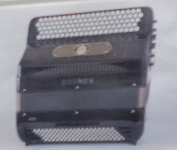I was talking about the fact that your MORINO was not the only Bayan that Hohner made… they made a Gola Bayan and a few more (numbar unknown to me) MORINO Bayans in both CBA and PA. Per my discussions with the man that was involved with every Gola in the last decade+, that Gola Bayan is a 1 of 1.
Hohner is not so much a mystery as they are experimenters. They try things, if it sells, they make more, if not they sell off what they made and move on. The accordion museum in Superior Wisconsin has many of Hohner’s “experiments” (at least 3 or more Gola alone, and more in other models all from Hohner) and in the Trossingen museum, there is a very cool looking Morino that is a VI N on the right hand and 4-row C-system free bass ONLY (no Stradella) on the left side (just beautiful to see, I would love to try that one, but it was behind glass).
Hohner is pretty well known for making “one-offs”, even Paul referenced some kind of Hohner that had Cassotto that no other Hohner of that designation ever had… another 1 of 1.

These experimentals are all made in Trossingen. If a design is ratified, they may send what is needed to get the models done outside to save money

